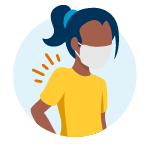Pfizer’s COVID-19 Vaccine Authorized for Children 6 Months and Older
Coronavirus Resource Center > Vaccine Overview > Articles & Resources
What’s different about the Pfizer shot for children?
The vaccine that's authorized for use in children is the exact same vaccine that adults are receiving. The dosage for children ages 12-15 is the same as adults. Children ages 5-11 receive a lower dose of the vaccine. The dose for children 5-11 is about one-third that of the adult dose. These three age groups require two injections three weeks apart to be considered fully vaccinated. For children ages 6 months through 4 years, they should get three doses of Pfizer BioNTech in the primary series. The first and second doses should be separated by three to eight weeks and the second and third doses should be separated by at least eight weeks.
How did they test the vaccine?
Pfizer tested their COVID-19 vaccine in closely monitored clinical trials. The results were very positive. Studies found that the vaccine worked as well—if not better—in younger people than in previous trials with people 16 and older. In data made available to the FDA, the vaccine was 100% effective in preventing COVID-19. The length of time that the vaccine offers protection is still unknown.
Are side effects different in children?
Side effects in children largely mirror the side effects we’ve seen in adults. The most common side effects can be treated at home with rest, hydration and over-the-counter pain medicine.
In some rare cases, recipients have experienced severe allergic reactions. The Pfizer COVID-19 vaccine should not be given to anyone with a known history of a severe allergic reaction, including anaphylaxis—to any component of the vaccine. As a precaution, you’ll be asked to remain at the vaccination site for around 15 minutes for monitoring just in case your child has a reaction.
If your child experiences a severe reaction within hours of their shot, call 911 or head to the nearest hospital.
Common side effects include:
- Pain at the injection
- Tiredness
- Headache
- Chills
- Muscle and joint pain

I thought children didn’t get sick with COVID-19. Why should my child get vaccinated?
While it’s true that most children that catch COVID-19 have more mild symptoms, some kids can get sick enough to be hospitalized. Tragically, there are rare cases of children dying from COVID-19. Plus, kids can carry the virus. So even if your child doesn’t appear sick, they can spread the virus to other people who may end up hospitalized with severe COVID-19. We know that all authorized vaccines reduce the risk of spreading this deadly virus. Getting the COVID-19 vaccine is your decision, but it sure beats catching COVID-19.
Where can my child get the vaccine?
If your child’s pediatrician isn’t offering the shot, you can check vaccines.gov or your local health department for a location near you.
When can my child get the Pfizer vaccine?
Right away. The vaccine that’s been authorized for children is the same vaccine that adults have been getting since late 2020.
Choosing to vaccinate your child against COVID-19 is a personal decision. Research and rigorous clinical testing show that the vaccine will protect your child from severe COVID-19. If you have any questions, be sure to have a conversation with your child’s doctor.
Discuss the vaccine with your children, too. Help them understand how the vaccine works, why it’s important to get and what the side effects might be like. Everyone doing their part, together, is the quickest path back to the activities we love and miss.